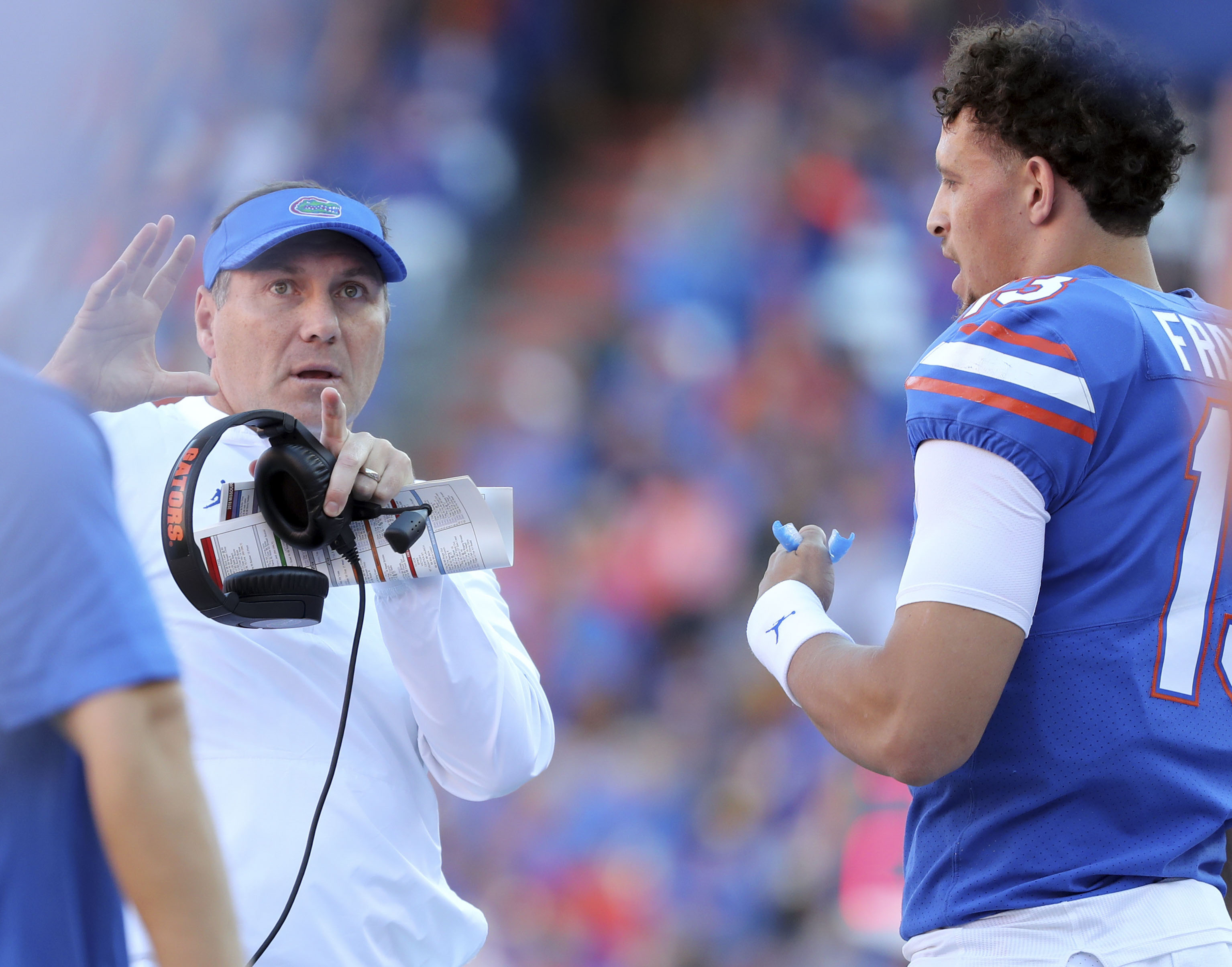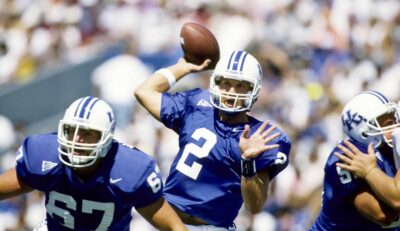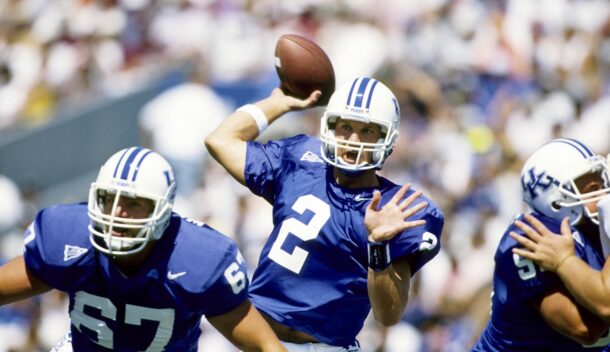
10 weeks in, and Dan Mullen still doesn’t have a QB he can fully trust. That’s a problem
For the second consecutive season, Florida was demolished by Missouri, this time falling 38-17 in The Swamp on Homecoming.
Feleipe Franks was benched in the second half, giving way to Kyle Trask, who appeared to provide the offense a spark on an immediate touchdown drive.
As a result, the postmortem on Florida’s defeat has focused less on a defense that is falling apart at the seams and more on Franks, who followed up a miserable performance against Georgia with an even more abysmal 9-for-22 for 84-yard effort against Missouri. Franks’ performance Saturday was all the more frustrating given it came against a Barry Odom Tigers defense that entered Gainesville with one of the nation’s worst pass defenses (123rd nationally). If Franks can’t find success against Mizzou’s secondary, when will he find success against Power 5 opposition?
Florida’s collapsing defense is worth discussing and we’ll spend more time in this space doing so later this week.
It’s natural, however, for the immediate focus to be on Franks, who, now near the end of his redshirt sophomore season and second year as a starter can no longer really use “youth” as an excuse for inconsistent performance. As Dan Mullen was quick to remind Franks this spring, “extra scrutiny goes with the territory when you play quarterback at Florida,” a place with three living Heisman winning quarterbacks canonized by statutes just outside the football facility.
If you polled the Florida fan base, who pay money to attend games and write checks but aren’t paid to made decisions, the majority would argue that it’s time for a change at quarterback. That doesn’t seem like an incendiary opinion — after all, Trask showed a nice understanding of the offense in making multiple check-down throws after reading his progression.
But coaches don’t make changes for the sake of making changes, and as difficult as it might be for Florida fans to swallow or understand, Mullen and his staff are likely not ready to punt on the 2018 season and build for the future.
Coaches, especially first-year coaches who aren’t worried about job security, don’t think this way. They are cut from competitive cloth and tend to have decent-sized egos, and folks like that want to win every game. Mullen and his staff are likely to play the guy who they think gives the Gators the best chance to finish 2018 with 9 wins and only 3 losses. In truth, they are paid to do that and it should be their primary present focus, even as they worry plenty about recruiting and the future of Florida football.
That’s where Mullen’s quarterback decision for the South Carolina game begins to get tricky.
After the loss, Mullen hinted that Franks has reached the end of what he called a “long leash” earlier in the season. He also stated that the team would “like to redshirt (true freshman blue-chip) Emory Jones,” which decreases the likelihood Mullen will cave to the portion of the fan base clamoring for Florida to play the true freshman now and build for the future. That means it’s a Trask vs. Franks debate, and that’s one that, over and over again, Franks has won.
Franks has won that debate forever because this coaching staff believed, at least through the Missouri game, that Franks gave Florida a better chance to win than Trask.
It’s worth exploring whether that’s true again, which is why Mullen is reopening the competition this week, but the answer isn’t simple.
First, here’s what’s obvious about Franks.
He has been better in 2018 than he was in his freshman season, which by any objective measure was a train wreck. His touchdowns per attempt percentage is nearly doubled, his interceptions are down, his yards-per-attempt numbers are up almost a yard (7.1-6.3), his completion percentage has improved, albeit nominally, and his big-play percentage, pass efficiency numbers and total QBR are all improved. Mullen has coached him up and he’s played better.
What’s also becoming clear is Franks has a ceiling, especially against better competition.
Here’s how Franks has played against teams ranked in the top 40 nationally in Total Defense and yards-allowed-per-play.
[table “” not found /]That’s a completion percentage of 54.7% with 4 TDs and 4 INTs. Those numbers aren’t terrible — and Franks was relatively efficient against an elite Miss State defense on the road. But the yards per attempt are poor: 6.13 (a full yard below his season average) and the bulk of his damage has come on short throws to receivers who then make plays in space. Franks’ longest completion against those four defenses was this beautiful 49-yard pass completion to Josh Hammond against LSU.
10/6/18—Florida's Feleipe Franks 49-yard pass complete to Joshua Hammond vs. LSU pic.twitter.com/wKuqCuINwJ
— College Football Clips (@CFB_Clips) October 24, 2018
Unfortunately for Franks, this hasn’t happened much. He had only 2 completions of 30-yards or more in the other three games combined.
Franks’ inability to challenge quality defenses down field is harming Florida’s offense, which has been buoyed this season by an improved power running game. It also has made Florida a predictable film study as the season wears on, which reared its head Saturday evening against Missouri. Barry Odom and the Tigers happily pressed the line of scrimmage to limit Florida’s success in the short passing game. Forced by Missouri to make plays in the intermediate pass game and down the field, Franks was nowhere near up to the task.
This gets us back to Trask.
Just as defenses adjusted to limit Franks small area of strength, they will adjust to Trask, who is less athletic than Franks and has, in limited action, appeared too ready to surrender a play and check down. Defenses will have decent film of Missouri rattling Trask with the blitz, and eventually, they will take away check down options with linebackers and zone blitzes and force Trask to make accurate throws down the field. If he can’t do that, Florida risks having a less athletic version of Franks as the signal caller.
Even if Trask can make enough throws to give Florida’s offense a downfield spark in the passing game, the other issue is time.
With a trip to Atlanta and a New Year’s 6 bowl both out of the picture, Florida’s visit to Tallahassee and a reeling FSU on Nov. 24 is suddenly the most important game on the schedule.
The Gators figured to be prohibitive favorites a week ago; now, their ability to end Florida State’s decade-long stranglehold over the rivalry is less clear. It’s a game Florida and Mullen must have, for recruiting purposes and to avoid giving the struggling Willie Taggart regime in Tallahassee a huge momentum boost heading into the offseason.
Florida’s primary question, should it switch to Trask, is whether three weeks — and one legitimate game — is enough time to prepare Trask for a road start against FSU, which for all its struggles, still boasts a defense in the Top 40 in S&P+ defense and one that is especially good against the run, which is Florida’s strength. If that sounds familiar, it should: The Missouri defense was one of the nation’s best against the run — and the Tigers’ ability to limit the Gators’ power running game and force Florida to win the game in the air is why there’s a quarterback debate again in Gainesville.
The truth is that neither Franks nor Trask appear to have championship ceilings — or if Trask does — he hasn’t shown it in three years on campus, a claim we can defend by pointing out that if he had shown it, he certainly would have beaten out the decidedly mediocre Franks before now.
As good a play-caller and offensive schemer Mullen is, there’s only so many ways to cover up Franks’ various deficiencies. Further, because Mullen has long been among the nation’s best “rhythm” play-callers, his offense is forever limited by a quarterback who can’t extend defenses enough for Florida to take advantage of on-schedule numerical advantages in the spread.
Maybe Trask can, but he’s had three years to show it and hasn’t won the job.
As such, there’s a familiar and tiring refrain again circulating in Gainesville. T
Three years into the Franks and Trask eras and deep into Dan Mullen’s first year, Florida is still searching for an answer at quarterback. Until Florida finds or develops that player, the program’s efforts to chase Georgia and Alabama will be mostly futile. In the short term, the Gators would be better served by playing the guy who assures they get a critical recruiting win and beat Florida State.
Neil Blackmon covers Florida football and the SEC for SaturdayDownSouth.com. An attorney, he is also a member of the Football and Basketball Writers Associations of America. He also coaches basketball.







